Victoria, a love affair
by Guillermo Angulo
Translation by Juli Carbonell
Click images to enlarge |
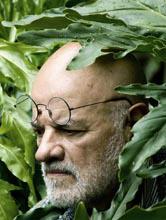 |
|
All began in New York, New York USA, in the 1980s. I was Colombia’s
Consul General in that city. One day I visited the Brooklyn Botanical
Garden and came face to face with the wondrous Victoria amazonica
in flower. Native of Colombia, my country, among others in South
America, it was a flower that I had only seen in pictures. And
it was love at first sight, love shared only with my first orchid,
a solitary Cattleya hybrid, deep yellow in color, the
color of a cricket’s song according to the poet, that for
a while bloomed in the window of the kitchen of my apartment
overlooking the Hudson River. |
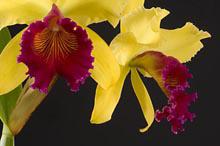
|
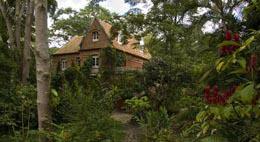 |
On my return to Colombia, chance allowed me to buy, for a ridiculously
low price, an old and beautiful country house built in the English
style, abandoned and neglected for a long time, that once belonged
to Miguel Abadía Méndez, President of Colombia
in the years 1926-1930. This house was surrounded by two acres
of land, “too big for a garden, too small for a forest”. |
|
Once the house and land came into my possession I decided
that this was where I would start my orchid collection and that
I was going to try the impossible: to successfully grow Victoria
amazonica or more precisely, a Victoria hybrid, in
an inappropriate climate and at an excessive height of 1,650
meters (5,414 feet) above sea level. I was to grow one Victoria
from seeds provided by Jack Honeycutt, but unfortunately this
plant only lived for about two years.
Then I came across Kit and Ben Knotts, a very successful husband
and wife team of experts, who became my main source of advice
and know-how. They not only offered solutions for any technical
problem that I encountered but generously sent me the required
Victoria seeds. Kit is, among many other things, an accomplished
horsewoman, a true horse whisperer, and Ben a retired medical
doctor who has found peace and quiet at Kit’s side. They
have in their garden a large and beautiful pond overlooking the
Atlantic Ocean, full of Victorias, “Reflection”
by name, that in its surface reflects the changing forms and
colors of the sky and at the same time offers the bystander a
chance for introspection and soul searching.
Today I have left only one plant, grown from the seeds they
had provided, seeds that arrived exactly the day that I
was abducted by the FARC, a guerrilla group active in Colombia.
One of my sisters thought that it was best to throw away the
seeds but my oldest son, Alessandro, decided to follow the instructions
previously sent by the Knotts, instructions that I had carefully
saved. He then proceeded to put in seeds inside a plastic ziploc
bag which, once closed, was placed in a small fish tank full
of water kept at 28º Celsius (82 F). “My Father will
be very happy to see his seeds sprouted when he is released from
captivity,” Alessandro said, and he was right! |
|
This original Victoria must be one of the oldest cultivated
Victoria plants in the world, since it was set to sprout
exactly on March 17, 2001, and the same plant that today, eight
years later, continues to bloom every three to four days, most
of the time under lower water and ambient temperatures than are
desired. |
|
My gardener Crisanto Gutierrez, nicknamed by his rotund appearance
Monsignor, gives the Victoria the tried and true
“chop and drop” method of cutting away the rotting
part of the roots and is so skilled at this task that the plant
barely takes notice. He also gives the plant every week 16 ounces
of 10-14-16 granular fertilizer, packed in newspaper, so as to
have a well nourished Victoria. |
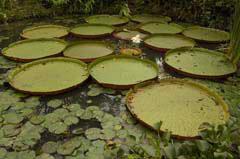
|
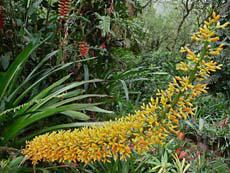
|
But, man not only of Victorias doeth live: in my country
garden more than 4.000 orchids grow and prosper. I keep some
orchid plants in shady sheds, some roofed with translucent plastic
sheets to keep away the copious rains; other orchids I just tie
to the trunks of trees. And in a delicious mess, growing in the
clearings of the garden, lots of other plants: Anthuriums,
bromeliads, Aristolochias, Heliconias. |
|
In the many ponds that I’ve built, I manage to grow other
aquatic plants, such as Eichhornias, Pistias, and
lotuses that only flower when the water and ambient temperatures
in Tegualda come close to those of their natural habitat. For
the rest of the year they lie dormant, but do not die, and as
soon as the temperatures rise they flower again, but only once
a year. |
|
At an age when other vices have abandoned me, one vice that has
remained is that of photographing my Victoria every week.
And to be continually astonished at the fact that I find its
flowers very different each time, even if it is the same plant
that is flowering. Maybe it is the loving eyes with which I gaze
at them. |
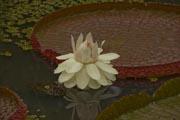 |
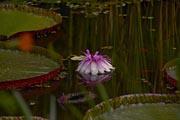 |
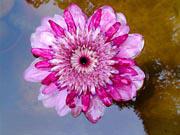 |
|
I’ve been able to keep my Victorias alive and blooming
at water temperatures as low as 14º C (57 F), since it is
only for two months every year that the temperatures in my country
place rise to the required 28º C (82 F). My method consists
of keeping the plants, in their infancy and adolescence, in water
kept at the correct temperature with the help of electric heater.
When the plantlets have overgrown the fish tank where they sprout,
I place them inside an old fashioned freestanding iron bathtub
filled with tap water kept warm with submersible water heaters
at 28º C (82 F). |
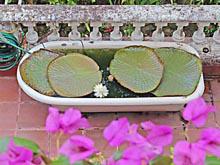
|
|
When the plants start blooming I wait until the water temperature
in the pond where they will moved equals the temperature in the
bathtub and then, and only then, do I move the plants so as to
have them suffer the least. They become stunted for a little
while since the water in the pond is not heated and the nights
turn colder. Unfortunately I lose some plants during this process
but the trick is to keep trying and trying until success is achieved. |
|
Right now my Victoria has a problem, it suffers from the
ministrations of a heron and I resist the true and proven method
of getting rid of this pest: the judicious use of a shotgun!
This animal is ruining part of the pads of the plant and its
favorite food now consists of the goldfish that swim in the pond.
I’m trying to find an efficient solution to this problem
far from the proposed cruel and non-ecological method. |
|
At the present I have two Victorias almost ready for the
move to the bathtub: a ‘Longwood Hybrid’ and a cruziana,
which will later be placed in two ponds to which I have given
the names of my two dear friends Kit and Ben, in honor of this
couple that, even though they are not botanists by profession,
have more knowledge of aquatic plants than many so-called “experts”
and are generous in excess in sharing their knowledge. |
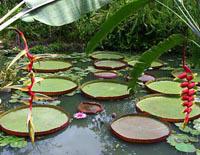
|
|
Today, when I feel more or less cognizant of the secrets for
the successful cultivation of Victorias, I declare my
complete ignorance in the cultivation of Nymphaeas, to
which endeavour I plan to dedicate my next efforts. I`m just
81 years old, thus my life still lies ahead. |
|








